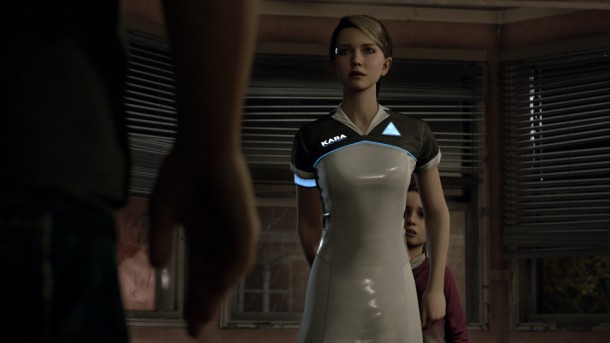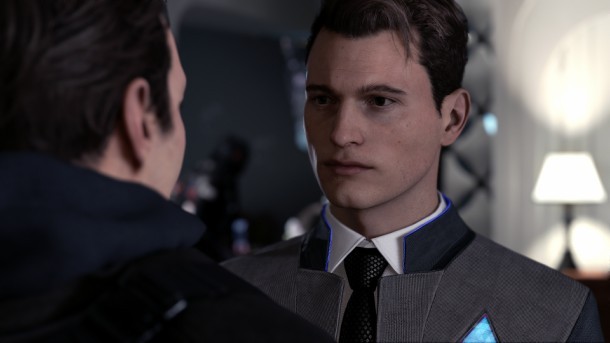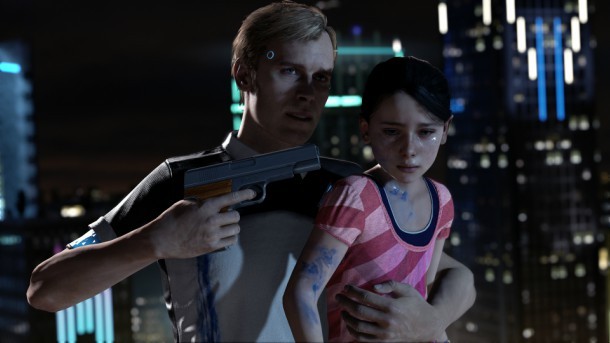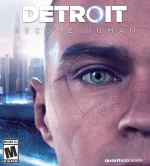Detroit: Become Human

Detroit: Become Human seems to invite concern with every stage showing over the past few years, stemming from an overall fear writer and director David Cage does not possess the chops for the subject matter he likes to tackle in his games. With Detroit, Cage is pursuing the worn foundation of Androids, commonly used in fiction as a springboard for metaphors about race, identity, paranoia, and secondhand citizenship. It is, if nothing else, an opportunity for Cage and Quantic Dream to prove their vocal critics wrong.
We played the Detroit: Become Human demo at PlayStation Experience 2017. The demo contained two scenarios, the first being the hostage situation that was first shown on stage to demonstrate the branching paths the game's narrative could take and again shown at Sony's PlayStation Experience presentation. In this scene, Android hostage negotiator Conner is tasked with defusing a hostage situation wherein an out-of-control Android has kidnapped a little girl and is holding her hostage after murdering her father. Conner is brought in and the player is given the choice of how to proceed.
The first task you are given once you take control is to meet with the captain currently managing the crisis. While you can go straight to the commanding officer, Conner can also examine various pieces of the environment to analyze clues and get a better picture of the assailant and increase his chances of negotiating, which is represented by a literal percentage counter that tabulates chance of success. Only some of the items in the room can be examined before you speak to the captain; everything else just produces a red barrier that the Android cannot cross due to programming telling him to speak to the captain first. It is unclear why the hallway is okay but the little girl's room is not.

When you do speak to the captain, he is curt, expressing his disdain for Androids in general, and his overwhelming need to get the girl safely out above all else, even if that means working with an Android as a negotiator. If you ask him questions like what the other Android's name is or what caused this behavior, he will simply tell you to go do your job. Another officer remarks how important it is to get the girl out, which makes it puzzling they would not aid Conner by answering simple questions that would literally increase the percentage chance of success.
Conner is then left, pardon the pun, to his own devices, and can either march out the door to confront the hostage-taker or continue exploring in now available areas to investigate clues. Despite the captain telling you that every second counts, you are free to basically do whatever while an invisible timer ticks down. Analyze clues, grab a gun you very much are not supposed to have, just stand around if you want, the choice is yours. Investigating the little girl's room reveals the bad Android's relationship with the family and his name that the captain clearly could have just told you.
After that time (which is not visible to the player) runs out, the captain barks that Conner must get out there. At the time, I was looking at an important clue which did not get added to my file despite my looking directly at it. I had not fully completed the crime scene reconstruction to show where the father's tablet fell, even though I could see it on the ground, and Conner remarking on the tablet being important. Still, you get moved to the veranda where the actual negotiation takes place.
It is a fairly tense scene, where Conner talks the other Android, Daniel, down with prompts of empathy and the clues he found searching the apartment while slowly walking forward toward him. The chance of success goes up and down depending on your answers, eventually reaching 100% chance of success and convincing Daniel to let go of the girl.
Either way, the police shoot him, and none of that really matters.

The other part of the demo is the scene shown at Paris Games Week with the Android Kara, a service robot that is cooking and cleaning for a drunkard louse who is unhappy with his life. Despite possessing an intense hatred for Androids himself, he requires Kara's help in keeping his home (which, for whatever reason, looks identical to Ethan Mars' house in Heavy Rain) running, as he does not possess the inclination or mental faculties while drunk to do it.
Kara's first task is to serve dinner, which she does by bringing two plates of spaghetti to the dining room table. A secondary objective to turn on the lights appears on Kara's HUD, which took some searching to figure out which of the room's multiple light switches was the one the game wanted me to touch. The father eventually scolds me for not turning on the lights yet while Kara stands directly in front of it, leaving me to wonder what he thinks I was doing while walking toward the lights.
For virtually no reason, the father flies off the handle and flips the table, sending the little girl upstairs. He orders Kara not to move while he works himself up with no other prompting until he decides to go beat his daughter. The entire thought process lasts about ten seconds and then Kara is given the opportunity to subvert her programming and break through the barrier keeping her there.
I ran upstairs, took the father's gun from his bedroom, and then pointed the weapon at him. The hostage demo I had played before established that Androids are very much not allowed to possess guns for any reason whatsoever, but Kara had just overcome her programming, so it made sense for her to take it. She pointed the gun at the father and threatened him to stop beating the little girl, at which point he mocks her for Androids not being able to kill humans due to their programming and then knocks the gun out of her hands.

What followed is a fight scene that is a genuine mess of quick time events. A smattering of prompts appeared, one after the other, designed to allow Kara to duck and weave the father's attacks. Despite being the same motions for Kara herself to perform, sometimes the prompts were analog stick movements, sometimes they were buttons, and sometimes they were gestures with the Dualshock 4. They all looked identical, making discerning between analog stick movement and gesture movement shockingly difficult in the heat of the moment.
After failing the quick-time events, the father is disposed of, and Kara and the little girl escaped on a bus. Without context, it is difficult to say whether that scene's cartoonish escalation was warranted or a symptom of a larger problem, but it left me raising more eyebrows than being curious at what's next.
The graphics of Detroit: Become Human are incredible and the music in the demo truly soars, but my fears about its writing have yet to be assuaged. Even without considering the scale of the story the game is trying to tell, individual scenes and dialogue are marred by poor execution, which could become a problem if those are the aspects the narrative needs to hang its hat on.
Detroit: Become Human is scheduled for release in 2018 exclusively on the PlayStation 4.










